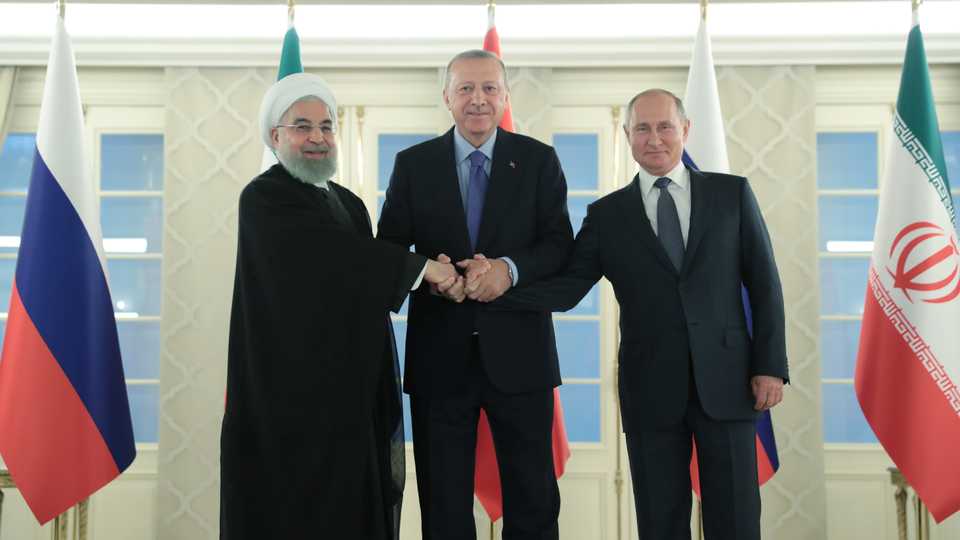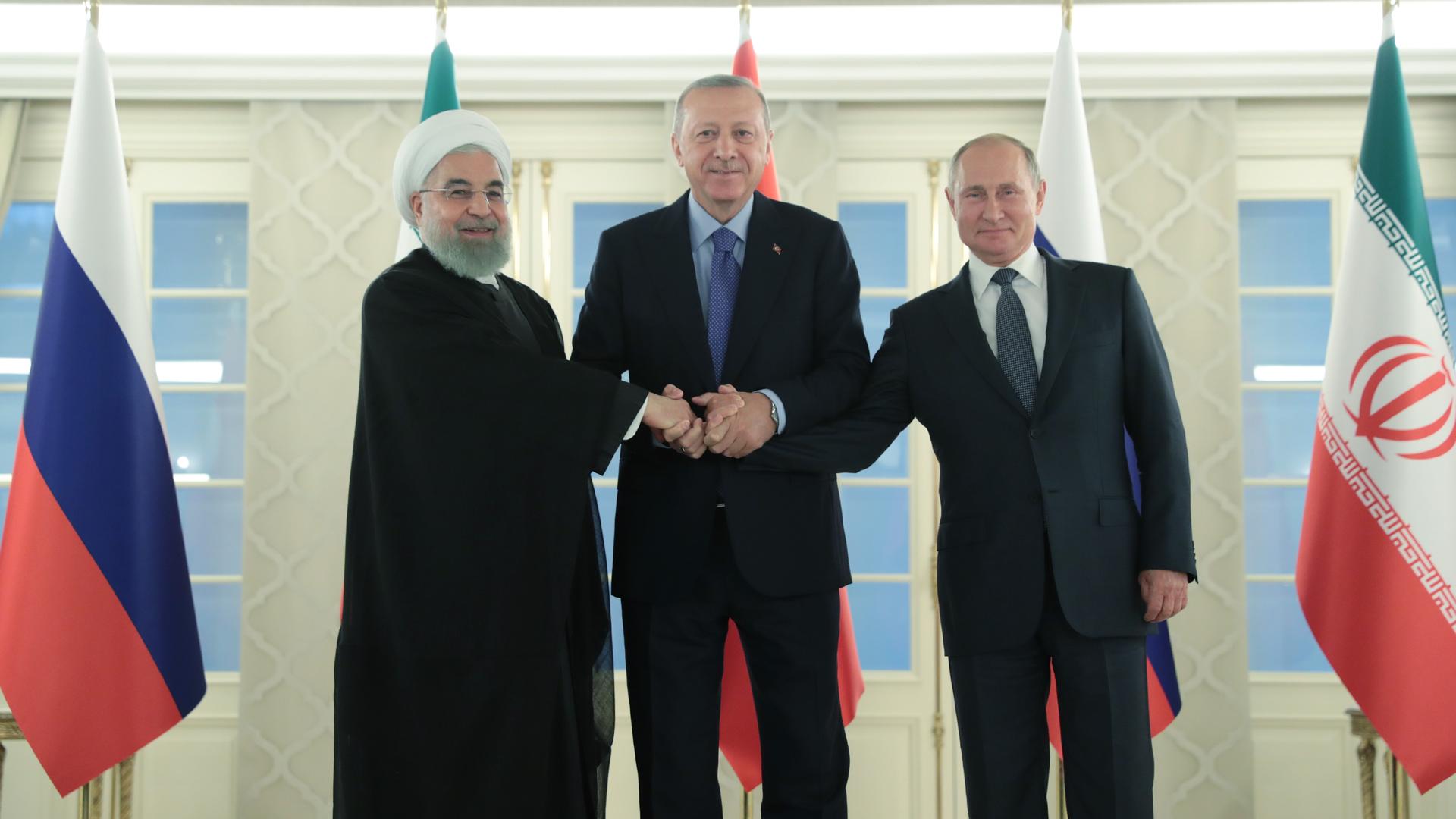
Turkish President Recep Tayyip Erdogan hosted his Russian and Iranian counterparts on Monday for their latest summit on Syria, vowing to work together to prevent further humanitarian crisis in the last opposition-held bastion of Idlib.
Presidents Vladimir Putin and Hassan Rouhani met Erdogan for separate talks in the Turkish capital, Ankara, before they all sat down for their fifth summit on the conflict since 2017.
“We are in complete agreement in aiming for a lasting political solution for Syria’s political unity and territorial integrity,” Erdogan said as the summit began.
Iran and Russia have been staunch supporters of Syrian regime leader Bashar al Assad, while Turkey has backed the opposition.
Turkey is focusing on preventing a new wave of refugee influx from Idlib into Syria’s northwest while the regime and its allies have increased its assault on the province.
Implementation of Idlib agreement
The presidents in the declaration “reviewed in detail the situation in the Idlib de-escalation area and underscored the necessity to respect calm on the ground by fully implementing all agreements on Idlib, first and foremost the Memorandum of September 17, 2018.”
Turkey and Russia agreed last September in Sochi, Russia to turn Idlib into a de-militarised zone where acts of aggression are expressly prohibited.
The Syrian regime and its allies, however, have consistently broken the terms of the ceasefire, launching frequent attacks inside the zone.
The zone is currently inhabited by about four million civilians, including hundreds of thousands of people displaced in recent years by regime forces from cities and towns throughout the war-weary country.
Turkey is concerned over the steady advance of Syrian regime forces, backed by Russian airpower, despite a series of ceasefires.
Turkey has 12 observation posts in Idlib to enforce a buffer zone agreement struck a year ago with Russia to prevent a full-scale regime offensive.
But the posts look increasingly threatened, with one cut off from the rest of Idlib when regime forces advanced last month.
Russian air strikes have continued in the region despite the latest ceasefire agreed by Ankara and Moscow on August 31.
“A zone of de-escalation should not serve as a terrain for armed provocations,” Putin said as the summit opened.
“We must take supplementary measures to completely destroy the terrorist menace that comes from the zone of Idlib.”
The final summit statement said the three leaders were “alarmed about the risk of further deterioration of the humanitarian situation in and around [Idlib] as a result of continued escalation and agreed to take concrete steps to reduce violations.”
Constitutional committee
They also said they had agreed on the composition of a constitutional committee tasked with rewriting Syria’s constitution as part of a political solution to the country’s civil war, now in its ninth year.
Erdogan told journalists that the last hitches blocking the formation of the committee have been overcome.
The parties agreed on a constitutional committee to be made up of pro-regime, opposition and independent members — paving the way for speedy talks in Geneva, Putin told reporters.
This was a priority for Moscow, which wants to add a political victory to its military successes, said Dareen Khalifa, senior Syria analyst at International Crisis Group.
But she told AFP that even an agreement on the committee “leaves a crux of issues unaddressed for the future of the political process, including the regime’s ability and willingness to undertake any kind of political reform.”
High on everyone’s mind at the summit was the weekend attack on Saudi oil facilities, which Washington has blamed on Tehran, deepening bilateral tensions and putting the region on the brink of further conflict.
Iran has been a crucial actor on the battlefield in Syria but has kept a lower profile in recent months.
Its focus has been on countering Israeli and US involvement.
“The presence of American military forces in a United Nations member and independent country such as Syria endangers its territorial integrity and national sovereignty,” Rouhani said at the start of the summit.
“American forces should leave the country at once.”
Iran’s concerns were partly reflected in the final statement, which said attacks by Israel in Syria were “destabilising” and a violation of Syrian sovereignty.
Turkey’s concern about the strengthened position of YPG militants in northern Syria was also reflected in the statement.
In a clear reference to the YPG, it said groups trying “to create new realities on the ground” and advance “illegitimate self-rule initiatives” were not acceptable.
Ankara is seeking to thwart the threat of the YPG, which is the Syrian branch of the PKK, a recognised as terrorist organisation by Turkey, the EU, and the US.
In a news conference after a trilateral meeting, Erdogan said PKK/YPG pose the “biggest” threat to Syria’s future.
“The PKK, and its extension the YPG/PYD, is the biggest threat to Syria’s future. As long as the PKK/PYD presence in the country continues, neither Syria nor our region can find peace,” Erdogan said.
Lasting truce
The summit aimed to assess the latest developments in war-weary Syria — the northwestern city of Idlib in particular — end the climate of conflict, ensure the necessary conditions for the voluntary return of refugees, and achieve a lasting truce and political solution to the Syrian turmoil.
The Astana peace process to end the Syrian conflict was launched in January 2017 at the initiative of Turkey, Russia, and Iran.
A total of 13 rounds were conducted in the Kazakh capital.
The Syrian conflict began in March 2011 after the regime violently responded to peaceful anti-Assad protests.
Since then the war has claimed hundreds of thousands of lives and displaced millions of others.










Discussion about this post